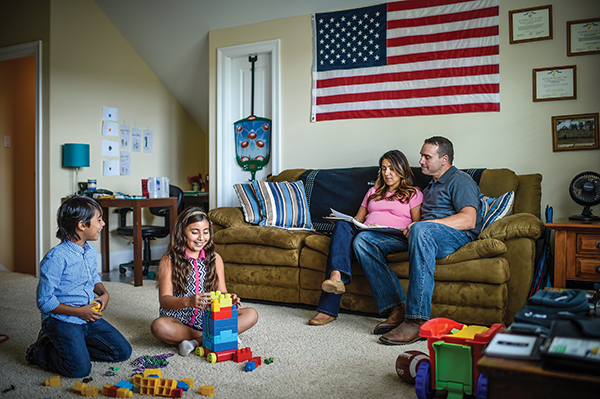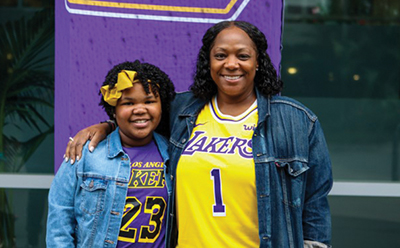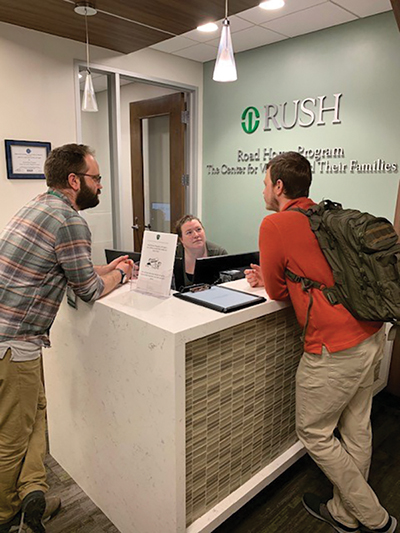
Warrior Care Network Helps Veterans Reclaim Their Lives
Post-traumatic stress is an invisible enemy.
Army veteran Yolanda Poullard has fought this enemy face-to-face and is well acquainted with the wounds it can cause.
“These are the wounds that don’t break the skin; they are hard to reach, hard to treat, and hard to heal,” she said. “These are the wounds that wake you up at night in a sweat, that leave you feeling helpless and alone. These wounds don’t break the skin, but break the heart, spirit, and mind of a soldier.”
Like many other soldiers, her return home was a bumpy road because of the experiences she and her team lived through. Yolanda did not want to leave the military. She had joined right after college, and that was the only life she knew. But things had changed.
“Once you return from war, you’re different,” Yolanda said. “You see the world differently and you see people differently. You’re angry and hurt. You’re traumatized.”
Yolanda found herself struggling with daily life, and her post-traumatic stress disorder (PTSD) symptoms interfered with her interactions with her spouse and her young daughter.
Yolanda is not alone. In a Wounded Warrior Project® (WWP) survey (https://www.woundedwarriorproject.org/survey) of the wounded warriors it serves, nearly four in five veterans (78.2%) report living with the symptoms of PTSD.

WWP created Warrior Care Network® four years ago to provide lifesaving clinical mental health care for veterans managing PTSD, traumatic brain injury (TBI), and combat stress. WWP partnered with four top academic medical centers to create Warrior Care Network, then included VA in the process to ensure veterans can seamlessly transition into and out of treatment.
“If it weren’t for Warrior Care Network, I would not be standing here today,” said Yolanda, who was on active duty for 18-and-a-half years and led 150 soldiers in a communications team in Iraq.
The clinical treatment provided by Warrior Care Network partner Operation Mend at UCLA helped Yolanda carefully relive her traumas to find effective ways to cope with each issue. Cognitive treatment retrained the brain, while mindfulness efforts helped Yolanda address stress in her life.
“After my treatment, it brought brightness back into my home, and we could all function as a family.”
Yolanda also appreciated how Warrior Care Network stayed with her when she returned home. Clinicians used monthly calls to provide follow-up care with Yolanda. She felt empowered by the knowledge she gained during treatment, knowledge she used every day.
“Warrior Care Network helped me in so many ways,” Yolanda said. “It taught me life skills that I use every day and are everlasting. It helped get out of the black tunnel and get back in society. It taught me to accept the new me – and to love the new me.”
Bill Geiger: Empowered to Get Back to His Family
As early as 2003, Bill Geiger knew he didn’t feel like himself. He was between deployments, and he caught himself having outbursts and panic attacks. His primary care physicians gave him medication. He wanted to look for additional help, but a new deployment came up, and he was off to Iraq.
“There’s no time to be angry or depressed when you’re deployed,” Bill said. “The chaotic drive of deployment masks the issues. Hollering, being depressed, and isolating myself from my family became the standard.”
By 2012, Bill knew he needed help. But like many other veterans, he considered himself undeserving of care.
“I had all my limbs and didn’t have any bullet holes; I didn’t deserve the attention,” he recalled.
He signed up for WWP connection events and sought out relief through WWP’s mental health workshops. His network of fellow veterans grew, and he started feeling that he had people to count on.
By 2012, Bill knew he needed help. But like many other veterans, he considered himself undeserving of care.
“I had all my limbs and didn’t have any bullet holes; I didn’t deserve the attention,” he recalled.
He signed up for WWP connection events and sought out relief through WWP’s mental health workshops. His network of fellow veterans grew, and he started feeling that he had people to count on.
“The folks at Wounded Warrior Project to me are angels; they’re the most kind and caring people I have met anywhere. Through them, I was introduced to Warrior Care Network, one of the biggest sources of support I have found.”
Bill successfully completed the Home Base program at Massachusetts General Hospital, part of WWP’s Warrior Care Network. He was in group and individual sessions; tried yoga, tai chi, and drawing; and discovered tools to help him manage real scenarios and feel more confident in social situations. He also received assistance finding the right people to support him after he returned home.
“They connect you with someone who specializes in PTSD before you go back,” Bill said. “They gave me so many tools to cope. If I have a bad day, I catch myself, and I apologize to my kids. I’ve learned that it’s OK to say, ‘I’m sorry.’ I practice resilience in my daily life.”
Warrior Care Network provides a year’s worth of mental health care in intensive 2- to 3-week programs. Warrior Care Network partner programs are Operation Mend at UCLA Health; the Veterans Program at Emory Healthcare; Road Home at Rush University Medical Center; and Home Base, a Red Sox Foundation and Massachusetts General Hospital Program.

WWP offers access to these services thanks to the selfless and generous support of people who want to give back to veterans who have given so much.
More than 3 million brave men and women have been deployed. It is estimated more than 600,000 manage PTSD and 300,000 live with a TBI. Warrior Care Network was developed to fill gaps in services for returning service men and women.
Traditional mental health care has its challenges: high drop-out rate, lack of satisfaction, barriers to care. Warriors needed a program that offered open and healthy dialogue, a true learning network, open sharing of data, and learning from each other. Warrior Care Network’s goal is not only to help warriors survive but thrive and become leaders. More than 1,500 warriors have completed the intensive outpatient program. More than 96% of these men and women would recommend it to their fellow warriors. With a new extension of this treatment program, Warrior Care Network will treat and serve more than 16,000 warriors and families over the next five years.
For warriors like Bill and Yolanda, knowing there are ways to get help brought hope of a new life.
“What I know now is there is help for soldiers and veterans, whether you are active or retired,” Yolanda said. “If you do not know how to get help, just ask! The help I received from Warrior Care Network was life-changing. You can overcome any mental illness such as PTSD and live a normal life with the right treatment.”
WWP is committed to helping wounded veterans achieve their highest ambition. When they’re ready to start their next mission, WWP stands ready to serve.
Learn about how WWP’s free programs and services in mental health, career counseling, and long-term rehabilitative care change lives, and how you can help at https://wwp.news/Donate.
About Wounded Warrior Project
Since 2003, Wounded Warrior Project® (WWP) has been meeting the growing needs of warriors, their families, and caregivers – helping them achieve their highest ambition. WWP is a national, nonpartisan organization accredited with the Better Business Bureau (BBB), top rated by Charity Navigator, and holding a GuideStar Platinum rating. To get involved and learn how WWP connects, serves, and empowers, visit http://newsroom.woundedwarriorproject.org/about-us.
About the Author
Mike Richardson is vice president of independence services and mental health at Wounded Warrior Project® (WWP). He leads mental health and independence program teams that seek to meet warrior mental health care needs (including PTS and TBI treatment) in innovative and lifesaving ways.
Mike’s position at WWP solidifies his passion to serve a population that he was and continues to be engaged with. Mike began his military service in 1981 as a 17-year-old private and retired 32 years later in 2013 as a medical service corps lieutenant colonel. He last served as the director of the disability evaluation system for Army Medicine as part of the Army staff. He also commanded the Warrior Transition Battalion for Europe from 2010 to 2012, where his relationship with WWP began. During his last 15-month deployment to Iraq, he served as the Iraq theatre medical regulating officer and was responsible for the coordination of all patient movement within and departing from Iraq.




